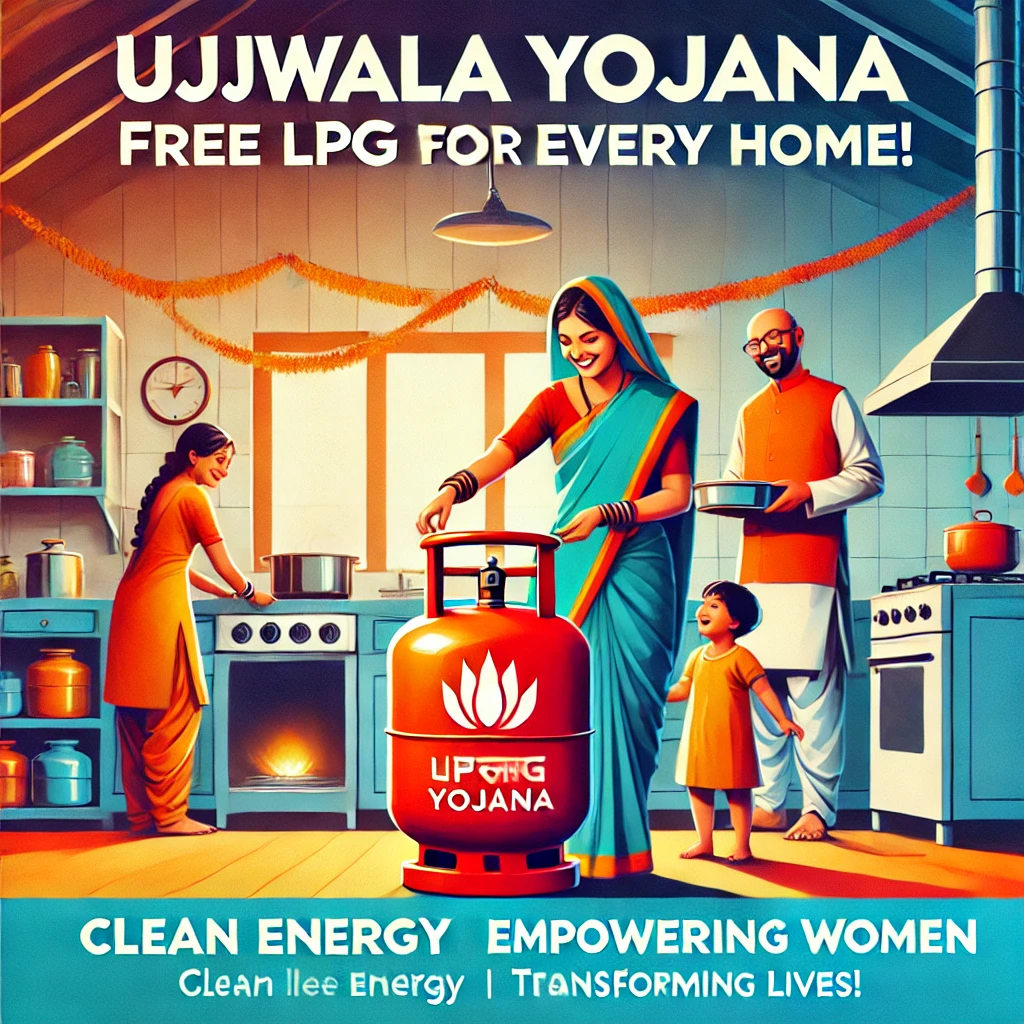Introduction to Ujjwala Yojana
The Ujjwala Yojana, launched by the Government of India in 2016, is a revolutionary scheme aimed at improving the quality of life for millions of households across the country. Officially known as the Pradhan Mantri Ujjwala Yojana (PMUY), this initiative seeks to provide free LPG (Liquefied Petroleum Gas) connections to economically disadvantaged families, empowering them with access to clean cooking fuel and significantly reducing their dependence on traditional cooking methods like wood, coal, and dung cakes.
By addressing critical health, environmental, and socio-economic challenges, Ujjwala Yojana has emerged as one of the most impactful welfare programs in India’s history.

Key Objectives of Ujjwala Yojana
The Ujjwala Yojana scheme was designed to achieve the following goals:
- Reduction of Health Hazards: Prolonged exposure to indoor air pollution caused by traditional cooking methods can lead to severe respiratory and cardiovascular diseases. Ujjwala Yojana aims to reduce these health risks.
- Promotion of Women’s Empowerment: Women, who are primarily responsible for household cooking, benefit immensely from LPG connections by saving time and effort, which can then be redirected to education, skill development, or economic activities.
- Environmental Protection: The program reduces the cutting of trees and carbon emissions, promoting cleaner and greener energy.
- Poverty Alleviation: By providing subsidized or free LPG connections, the scheme helps underprivileged households transition to safer cooking practices without financial strain.
Eligibility Criteria for Ujjwala Yojana
To ensure that the benefits reach those who need them the most, the Government of India has laid out specific eligibility criteria under the scheme:
- Socio-Economic Status: The applicant must belong to a Below Poverty Line (BPL) household and should be listed under the SECC (Socio-Economic Caste Census) 2011 data.
- Gender-Specific Beneficiaries: The scheme is targeted primarily at women over 18 years of age, ensuring gender inclusivity.
- No Prior LPG Connection: Families that do not already possess an LPG connection are eligible to apply.
- Bank Account: The applicant should have a bank account to receive the subsidy directly.
The scheme also prioritizes families belonging to Scheduled Castes (SC), Scheduled Tribes (ST), and other marginalized groups.
Implementation Process
To make the process seamless and transparent, Ujjwala Yojana follows a structured implementation approach:
- Application Submission: Eligible candidates can apply through their nearest LPG distributor by submitting a filled application form along with necessary documents like proof of identity, address, and BPL certification.
- Verification: The application is thoroughly verified against the SECC database to ensure compliance with eligibility requirements.
- Subsidy Allocation: Once approved, beneficiaries receive a free LPG connection, along with a subsidy to cover the cost of the first refill and stove.
Over the years, the scheme has undergone several enhancements, including the introduction of Ujjwala 2.0 to expand its coverage and offer additional benefits such as free refills and stove maintenance.
Impact of Ujjwala Yojana
Health Benefits
The introduction of clean cooking fuel has led to a significant reduction in indoor air pollution, which was previously responsible for millions of premature deaths annually. Women and children, who spend more time indoors, have particularly benefitted from the improved air quality.
Environmental Conservation
Ujjwala Yojana has contributed to the reduction of deforestation and greenhouse gas emissions. By promoting LPG as an alternative to biomass, the scheme aligns with India’s commitment to sustainable development goals.
Economic Empowerment
The scheme has enabled women to save considerable time previously spent collecting firewood, which they now utilize for education, skill enhancement, or earning livelihoods. This has played a vital role in promoting women’s empowerment and poverty alleviation.
Social Transformation
The widespread adoption of LPG has brought about a shift in societal norms, reducing the stigma associated with traditional cooking practices. It has also bridged the urban-rural divide in energy accessibility.
Challenges and Criticism
While Ujjwala Yojana has achieved remarkable success, it is not without challenges:
- Refill Costs: Many beneficiaries struggle to afford subsequent LPG refills after the first subsidized cylinder, leading some to revert to traditional fuels.
- Awareness and Accessibility: Limited awareness about the scheme and logistical challenges in remote areas have hindered its full potential.
- Infrastructure Gaps: Inadequate distribution networks in rural and remote areas create hurdles in ensuring timely delivery of LPG cylinders.
The government has addressed these issues by introducing additional subsidies, improving distribution networks, and launching awareness campaigns.
Future of Ujjwala Yojana
With the launch of Ujjwala 2.0, the government has taken significant strides to expand the program’s reach. The updated version includes benefits like:
- Providing free refill cylinders to reduce financial strain.
- Simplifying application processes with self-declaration for migrant workers.
- Enhancing last-mile delivery infrastructure for seamless access.
The vision is to make clean cooking fuel accessible to every household in India, transforming lives while ensuring environmental sustainability.
Conclusion
The Ujjwala Yojana is a testament to India’s commitment to empowering its citizens and promoting sustainable development. By providing clean cooking fuel to millions of households, the scheme has improved health outcomes, empowered women, and contributed to environmental conservation. Despite its challenges, Ujjwala Yojana remains a pioneering initiative that continues to shape India’s socio-economic landscape.